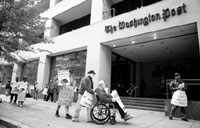
WASHINGTON (FinalCall.com)–The major corporate-owned news media in this country are indifferent to voices of dissent against President George W. Bush’s calls for another war against Iraq, and may actually be hostile to Black opponents, according to a group of activists here who protested outside the offices of The Washington Post to illustrate their point.
“There is clearly a political process underway in these newsrooms to mischaracterize what’s happening with this anti-war movement in order to support the Bush administration’s drive towards war,” Damu Smith, co-founder of Black Voices for Peace (BVP), said of his group’s efforts to hold major media outlets such as The Post, The New York Times, and the major television networks accountable.
Executives at the newspaper–which also owns Newsweek magazine and several television stations–have taken note of the protest. Pulitzer Prize-winning former executive editor and current vice president-at-large Ben Bradlee came out and spoke with demonstrators on the picket line, according to Mr. Smith.
“I’ve looked into this because both the protest outside The Post and because I’ve gotten a couple of calls,” Post City Editor Gabriel Escobar told The Final Call. “When I went back and looked at things there was one early protest that was actually organized by Black Voices for Peace that drew several other participants. There was no mention of the organizers” in that story Mr. Escobar admitted.
“In a case like that, reading the story I realized that we should have mentioned (BVP) there because they were the organizers and it drew other people. But we wouldn’t go through a list of all the groups.” The vigil, near the White House, in fact drew more than 1,000 protestors from a variety of sympathetic organizations.
“In this case, that story didn’t mention (BVP) and it should have. There was a subsequent protest where we simply did not mention them as well. There was another protest we did not cover. We do not cover all protests here. To be more specific to Black Voices for Peace, we should have in that earlier story noted that they were one of the organizers because I think that’s important. Whether you would make the leap that because we didn’t, it’s because we’re not interested in this movement, or the opposition of Blacks to the war … we just don’t want to take note of that because we have a hidden agenda, well I would take exception to that,” Mr. Escobar continued.
Colbert King, deputy editorial page editor, holds activists responsible for not getting their message onto the newspaper’s op-ed pages, however. “I haven’t seen the pieces. They haven’t been sent to me,” Mr. King said in an interview.
“People submit pieces to us for publication,” Mr. King continued. “We get several hundred unsolicited proposed op-ed pieces per week. What I would encourage them to do is, when they have something they want to write and submit, send it to me. That’s what I’m here for.
“Really. I’m always looking. (If) somebody’s got something to say, they’ve got to write it. Don’t fuss about it. Write about it,” he said.
“We haven’t announced a boycott of The Washington Post, but we’ve outlined steps to put pressure on The Post and other news outlets to be more accountable,” Mr. Smith said.
“See, The Post thinks that we had that one demonstration and we’re just forgetting about it. That doesn’t mean anything for us, because this is not about Black Voices for Peace. This is about the way The Post has not reported on the anti-war movement and the way they have refused to acknowledge the presence of Blacks and other people of color in that movement, including the activity sponsored by Black Voices for Peace.”
White media executives feel that the Black community shouldn’t have any voice in the debate about war and peace, according to the Rev. Graylan Hagler, Pastor of Plymouth Congregational United Church of Christ, co-founder of BVP, and president of the National Christian Muslim Alliance. “Therefore, they have chosen to simply categorically ignore it,” he told The Final Call.
On the other hand, he said, “when it comes down to violence and death within the culture, and particularly within the Black community, there is no hesitancy on the part of the media to jump out and cover it page-to-page, front-to-back. (But) when there is valuable and credible opinion that may differ with the status quo, then all of a sudden there is no need to cover” what’s going on, the Rev. Hagler complained.
And while the Washington protest is spontaneous and not related to or connected with similar Black protests against news outlets in Philadelphia or Houston, a boycott of The Washington Post is not out of the question. “It has to come to that place very quickly. When you think of it, for those who have been in Washington, D.C., you know that news is segregated. There is a lack of interest in terms of covering what really takes place in neighborhoods and communities unless it is killings and shootings. But other than that there is a laziness,” the Rev. Hagler said.












